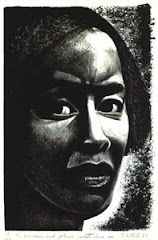is particularly known for his insightful, colorful portrayals of black life in America from the twenties
important in shaping the artistic contributions of the Harlem Renaissance of the 1920s
refused to differentiate between his personal experience and the common experience of black America. He wanted to tell the stories of his people in ways that reflected their actual culture, including both their suffering and their love of music, laughter, and language itself
The Weary Blues 1923
Droning a drowsy syncopated tune,
Rocking back and forth to a mellow croon,
I heard a Negro play.
Down on Lenox Avenue the other night
By the pale dull pallor of an old gas light
He did a lazy sway . . .
He did a lazy sway . . .
To the tune o' those Weary Blues.
With his ebony hands on each ivory key
He made that poor piano moan with melody.
O Blues!
Swaying to and fro on his rickety stool
He played that sad raggy tune like a musical fool.
Sweet Blues!
Coming from a black man's soul.
O Blues!
In a deep song voice with a melancholy tone
I heard that Negro sing, that old piano moan--
"Ain't got nobody in all this world,
Ain't got nobody but ma self.
I's gwine to quit ma frownin'
And put ma troubles on the shelf."
Thump, thump, thump, went his foot on the floor.
He played a few chords then he sang some more--
"I got the Weary Blues
And I can't be satisfied.
Got the Weary Blues
And can't be satisfied--
I ain't happy no mo'
And I wish that I had died."
And far into the night he crooned that tune.
The stars went out and so did the moon.
The singer stopped playing and went to bed
While the Weary Blues echoed through his head.
He slept like a rock or a man that's dead.
This poem is Hughes decription of a blues or jazz singer in Harlem during the twenties. The poem creates a somber or melancholy mood with the "piano moaning", and he "crooned the tune." It also sounds like the man was drinking as he sang the song which makes it seem like the man is more laid back. The man was not afraid to walk down Lenox street singing or speaking his mind becuase artist and singers were living in a time of great cultural upheaval.
Subscribe to:
Post Comments (Atom)




No comments:
Post a Comment